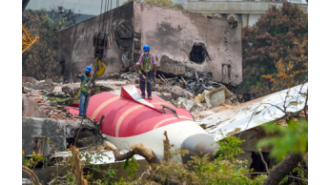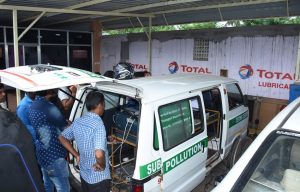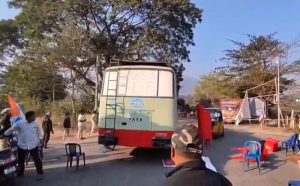Dad denied desired death, found on train tracks
He would have definitely chosen assisted dying if it was an option available to him.

Sarah Crampton fondly remembers the last time she saw her father, Mark. He had been a chief inspector for the Hertfordshire Police, leading a vibrant and fulfilling life. With his intense role, he had accumulated numerous stories and even spent seven years working for the government in Bermuda. Sarah describes him as a proud and masculine man, wise and unique in his approach to things. Many people who had met him had never encountered anyone quite like him before.
However, Sarah was devastated to see her father's drastic decline when she last visited him in 2020. Mark had been diagnosed with chronic obstructive pulmonary disease, a terminal lung condition, five years earlier and his health had rapidly deteriorated. He used to be a tall and broad figure, standing at 6ft 2in, but at their last meeting, he weighed only 8st 7lb and his clothes hung loosely on his frail body. His eyes had sunken into his skull, and he had stopped eating, causing his teeth to turn black. This strong and determined man was fading away, much to Sarah's heartache.
Mark's quality of life had become extremely poor, according to Sarah. He was on a multitude of medications for his COPD, as well as painkillers, sleeping pills, and relaxants for his severe sciatica. Sarah recalls how her father would often cough until he passed out, and his round-the-clock carers would find him covered in blood. It was a painful sight for Sarah to witness her once bold and brilliant dad, described by friends as a "force of nature," suffer in such a way.
Just days after Sarah's visit, she received a visit from two policemen. They informed her that Mark's body had been found on train tracks in the early hours of the morning. He was only 62 years old. Sarah reveals that her father was very intelligent and had wanted to find a way to end his life quickly and painlessly. He had left notes for his family, explaining his decision and sparing them the pain of finding him. However, knowing how her dad's life ended has deeply traumatized Sarah.
Due to the lack of assisted dying laws in the UK, Mark had to die alone, on a train track at 2am. Sarah suffers from PTSD from that traumatic event and still has gruesome images in her mind. She believes that if assisted dying had been an option, her dad would have chosen it without hesitation. It pains her to think that he died alone and unnecessarily in such a barbaric way.
Currently, only 200 million people across the world have the option of assisted dying, with laws in place in 10 US states, Australia, and New Zealand. Unfortunately, the UK is not one of them. While progress is being made, it is happening at a frustratingly slow pace. Recently, MPs passed a bill proposing assisted dying for those over 18 years old, with a terminal diagnosis and six months left to live. However, until this bill goes through a third round of voting in the Commons, gets approved by the House of Lords, and receives the upper chamber's seal of approval, assisted dying remains illegal in the UK, carrying a maximum penalty of 14 years in prison.
Research by Dignity in Dying has shown that 84% of the electorate in the UK are in favor of introducing assisted dying laws. They estimate that around 650 terminally ill people die by suicide every year in the UK. Sarah was incredibly close to her father, and watching his suffering affected her own mental health. They shared a special bond, which made it even more painful for her to witness his deterioration.
Sarah knows that her dad would have been in favor of assisted dying. They had often discussed heading to Dignitas, the assisted suicide clinic in Switzerland, but it was not a feasible option for them due to Mark's health. His back problems prevented him from traveling long distances by car, and his lungs couldn't handle air travel. Mark's health rapidly declined after his diagnosis in 2015, much to the distress of Sarah and their close relationship.
Assisted dying is by no means a straightforward solution, as Carmen Alkalai discovered when her mother, Sandra, was diagnosed with motor neurone disease in 2015. Carmen's mother, known as Sandy, had been a glamorous and creative woman, but her diagnosis brought about a rapid decline in her health. Carmen and her family quickly sought the option of Dignitas, but it came with its own set of obstacles.
As Sandy's body started to fail her, Carmen had to fill out forms and liaise with Dignitas to ensure her mother was a suitable patient. Two doctors had to confirm that she had a terminal illness with no quality of life, and Carmen had to provide forms such as her mother's dental records and even her late husband's death certificate. Assisted dying is not a simple solution, but for Sandy, it was a choice she was determined to make.
After months of discussion, Dignitas gave the green light for Sandy to travel to Switzerland and end her life with dignity. In February 2016, Sandy was accompanied by her two daughters for an emotional farewell to her family. Not everyone in the family agreed with her decision, but for Sandy, it was a choice she made for herself. Despite receiving palliative care, Sandy was disappointed with the lack of mental health support she received. Her daughters were offered counseling, but not her. It made her feel like "the invisible woman," as there was very little support for her.
Carmen recalls the heartbreaking moments when she had to perform the Heimlich maneuver on her mother several times a day, just so she could drink. They had to add gelatin to her water to make it easier for her to swallow. Sandy's death was a peaceful and dignified one, thanks to the option of assisted dying. It was a decision she made for herself and one that gave her control over her own life.
Sarah Crampton vividly remembers the last time she saw her father, Mark. It was a heartbreaking moment, as she knew he was nearing the end of his life. Mark had been a chief inspector for the Hertfordshire Police, leading a vibrant and fulfilling life. He had countless stories to tell from his time in such a demanding role, including his seven-year stint in Bermuda working for the government. Sarah fondly remembers her father as a proud and masculine man, filled with wisdom and a unique approach to life. He had a way of tackling things that left a lasting impression on those who met him.
But the man she loved so dearly was not the same person she saw during their last meeting in 2020. Mark had been diagnosed with chronic obstructive pulmonary disease (COPD) five years prior, and his health had taken a rapid and steep decline. Sarah describes how her once broad and tall father, standing at 6ft 2in, had shrunk to a mere 8st 7lb. His clothes hung loosely on his frail body and his sunken eyes were a stark contrast to the vibrant man she once knew. He was no longer able to eat and his teeth had turned black. It was devastating for Sarah to see her strong and brilliant father, who was often described as a "force of nature", fading away.
Mark's quality of life had become extremely poor due to his COPD. He was on various medications, including painkillers, sleeping pills, and relaxants for the excruciating pain caused by his sciatica. His condition had become so severe that he could have opened his own pharmacy. Sarah recalls the distressing moments when her father would cough until he passed out, or when his carers would find him unconscious and covered in blood. Just days after their last meeting, Sarah received the news that no one wants to hear - her father had passed away. He was found on train tracks in the early hours of the morning at the age of 62. He had taken his own life.
"My dad was so intelligent," Sarah shares, her voice quiet and filled with sorrow. "He wanted to find a way where he knew he was definitely going to die. He left us all notes explaining why he did what he did - so that his death would be quick and painless, and so we wouldn't have to find him."
But knowing the circumstances of her father's death has left Sarah deeply traumatized. She lost her dad to suicide, and it was made even more heartbreaking by the fact that assisted dying is not yet legal in the UK. Sarah suffers from PTSD, with gruesome images of her father's final moments still haunting her. She believes that if assisted dying had been an option for her father, he would have chosen it without hesitation. It pains her to think that he had to die alone, in such a barbaric way, because there was no other choice.
While assisted dying is available to 200 million people around the world, it is not yet legal in the UK. Progress is being made, but at a frustratingly slow pace. Recently, MPs passed a bill that would allow those over 18, given a terminal diagnosis and six months left to live, to choose assisted dying. However, until the bill goes through a third round of voting in the Commons, gets approved by the House of Lords, and receives the upper chamber's seal of approval, it remains illegal in the UK and carries a maximum penalty of 14 years in prison.
Research conducted by Dignity in Dying found that 84% of the electorate support the introduction of assisted dying laws, and an estimated 650 people with terminal illnesses end their own lives each year in the UK. Sarah had a close relationship with her father, and watching him suffer had a profound impact on her own mental health. She recalls how her father's rapid decline affected her deeply, and she became extremely depressed and even suicidal herself.
Sarah and Mark shared a special bond that had been forged since she was a child. It was excruciating for her to witness her father's suffering, knowing that she couldn't do anything to help him. They had often discussed the possibility of going to Dignitas, an assisted suicide clinic in Switzerland, but it was not a feasible option for them. Mark's back problems made it difficult for him to travel long distances in cars, and his lungs could not handle air travel.
Carmen Alkalai had a similar experience with her mother, Sandra, who was diagnosed with motor neurone disease. After her diagnosis, Sandra's health declined rapidly, and the family had to act quickly to ensure she could be considered for Dignitas. Despite her mother's wishes to end her life with dignity, Carmen faced numerous obstacles in making it happen. Two doctors had to confirm that Sandra was terminally ill with no quality of life, and Carmen had to produce various forms and documents to prove her mother's eligibility.
After months of discussion and paperwork, Dignitas gave the green light for Sandra to travel to Switzerland to end her life. She was accompanied by her two daughters in February 2016, after an emotional farewell to her family. However, not all members of the family agreed with her decision. Carmen recalls how her mother had received palliative care, but was disappointed by the lack of mental health support available to her. She remembers how her mother, who had once been a glamorous and vibrant woman, had to rely on her daughters to do even the most basic tasks for her as her body failed her.
The process of seeking assisted dying for a loved one is not an easy one, even when it is available. The emotional toll it takes on families is immense, and the lack of support for the terminally ill and their loved ones is disheartening. Sarah and Carmen's stories highlight the urgent need for laws on assisted dying in the UK, so that people like Mark and Sandra can have a peaceful and dignified end to their suffering.










